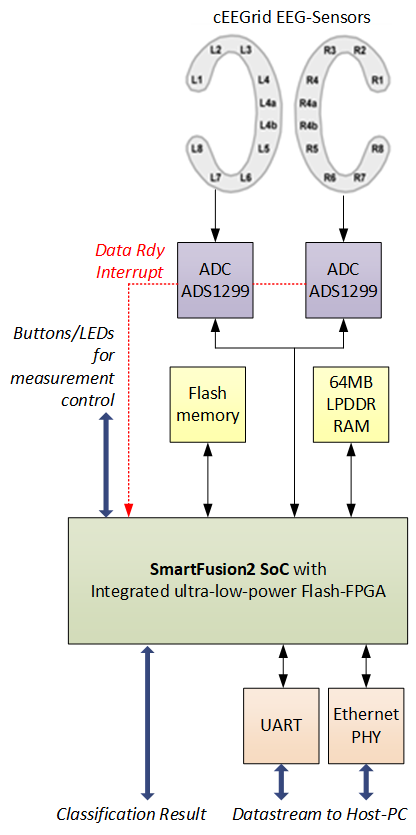Efficient Real-time Processing of EEG-Signals

| Led by: | Prof. Dr.-Ing. Holger Blume, Jun.-Prof. Dr.-Ing. G. Payá-Vayá |
| E-Mail: | 3621 |
| Team: | Marc-Nils Wahalla, Dipl.-Ing. |
| Year: | 2017 |
| Is Finished: | yes |
A brain-computer interface (BCI) is a system that generates signals to control an artificial system based on measurements of the activity of the central nervous system, for example, to replace, enhance or supplement certain tasks of human action. Modern BCIs are often based on the decoding or interpretation of EEG signals, as such systems are both non-invasive and cost-effectively available. These sensors detect a variety of independent, superimposed signals that make their immediate use for controlling a digital system difficult. Therefore, each application and corresponding application environment requires specifically designed and customized algorithms. This project therefore investigates methods for the efficient real-time processing of EEG signals. For this purpose, the Institute of Microelectronic Systems is developing a complete system of dedicated, configurable hardware in combination with a signal-processing framework specially adapted for the processing of EEG signals.
Furthermore, this project will also evaluate different EEG sensor platforms and examine their applicability to different scenarios. Common EEG caps with typically more than 20 electrodes, distributed equidistantly over the skull surface, prove to be cumbersome for everyday use. Therefore, more and more specialized EEG sensor platforms are being developed, which differ from EEG caps primarily in a smaller number and more specific arrangements of the used EEG electrodes. Generally, this leads to a significantly more convenient use. On the other hand, a lower informational content is assumed due to the lower spatial resolution. Therefore In the medium term, the research of the applicability of minimally cumbersome EEG solutions for individual classification questions and algorithms with (almost) constant classification accuracy is interesting.
The development of optimized algorithms for the processing of EEG signals requires physiological knowledge and is usually carried out offline within a software environment. In order to be able to test and optimize corresponding algorithms in real time, hardware-optimized processing is required. For this purpose, the developed framework should be easily accessible and easily adaptable to the respective task even without in-depth knowledge of the specific reconfigurable hardware. At the same time, to provide a high degree of flexibility in algorithmic processing, the developed framework must include as many processing steps of common algorithms as possible. For providing a basis for the selection of the corresponding algorithms, the publications in the environment of the so-called "BCI Competitions" are being used. As part of this competition, scientists were asked to develop appropriate algorithms for the respective problem of different classification problems, each provided with its own reference data set.
The developed hardware system should be equally suitable for laboratory use as well as for application-oriented environments. The former requires a variety of interfaces in local operation, e.g. connected to a Host-PC. An application-oriented use, however, necessarily requires a self-sufficient and thus battery-powered solution of the energy supply. To achieve maximum runtime at the same time, the system uses a Flash-based FPGA for signal processing implementation, which is explicitly suitable for ultra low-power applications.


